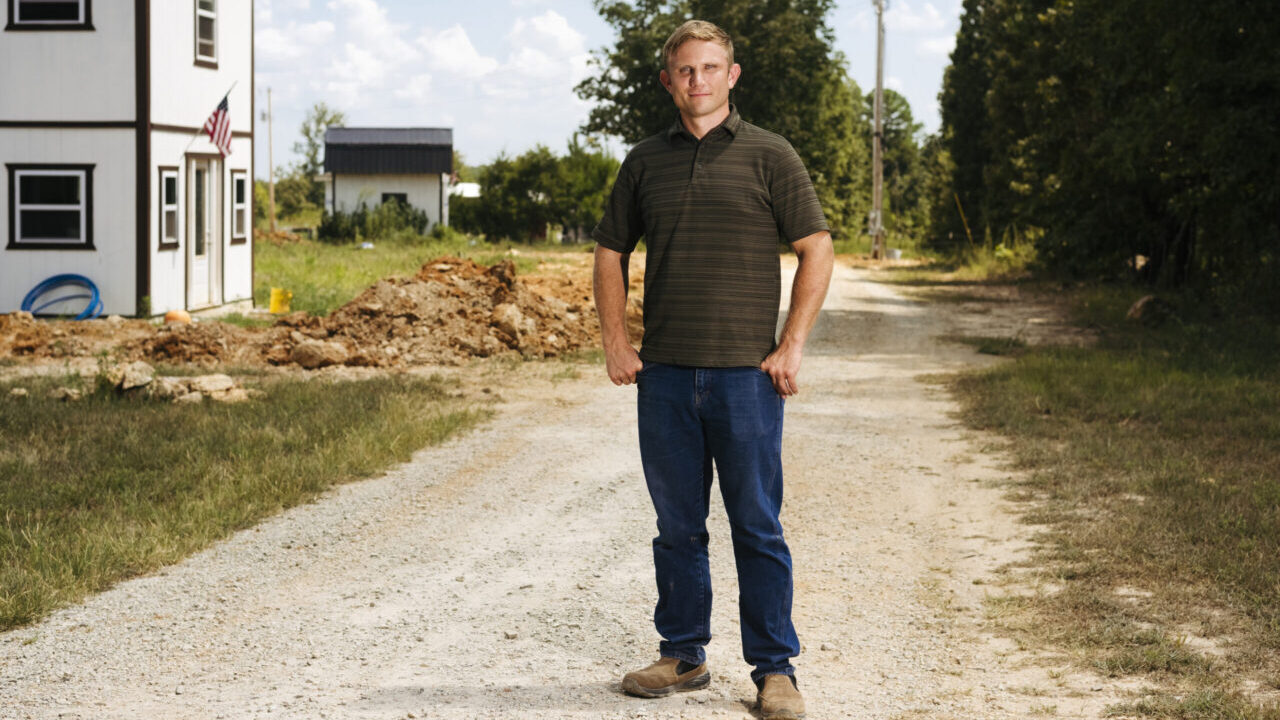Co-founder Eric Orwoll, at Return to the Land in rural Ravenden, Ark., where he and other white nationalists are testing anti-discrimination housing laws by barring non-white, non-heterosexual residents, on Aug. 11, 2025. (Whitten Sabbatini/The New York Times)

- In the Ozark Mountains of Arkansas, a small group of homesteaders is building an all-white community from scratch.
- The 160-acre Return to the Land community is strictly for white, heterosexual people who have passed a screening.
- Civil rights attorneys say said the group could be sued under the 1968 Fair Housing Act and the U.S. Civil Rights Act of 1866.
Share
|
Getting your Trinity Audio player ready...
|
RAVENDEN, Ark. — In the Ozark Mountains of Arkansas, nearly an hour from the closest city, a small group of homesteaders is building an exclusive community from scratch.
Applicants to the community are screened with an in-person interview, a criminal background check, a questionnaire about ancestral heritage and sometimes even photographs of their relatives.
The community’s two architects — a classically trained French horn player who has livestreamed his own sex videos, and a former jazz pianist arrested but not charged for attempted murder in Ecuador — say they must personally confirm that applicants are white before they can be welcomed in.
“Seeing someone who doesn’t present as white might lead us to, among other things, not admit that person,” said one founder, Eric Orwoll, who moonlights as a Platonic scholar on YouTube but is now focused on developing 160 acres in Ravenden, Arkansas, into a community strictly for white, heterosexual people called Return to the Land.
The Surging Far Right
The far right is surging in the United States, driven in part by white nationalists exploiting economic anxieties and a populace increasingly frustrated with the political status quo. Now, as the Trump administration rolls back diversity, equity and inclusion policies; cracks down on immigration; and offers pardons to white supremacists, some see an opening. In creating their community, the founders of Return to the Land are testing antidiscrimination housing laws that have been in place for 57 years.
The community’s other founder, Peter Csere, was arrested in Ecuador for stabbing a miner and is accused of stealing tens of thousands of dollars from a vegan community there. He and Orwoll say they believe Return to the Land meets the requirements for a legal exemption for private associations and religious groups that offer housing to their members.
Tim Griffin, the Arkansas attorney general, opened an investigation into potential legal violations by Return to the Land after reports on the community were published earlier in the summer in The Forward and on Sky News. Jeff LeMaster, his communications director, said in a statement, “We’re continuing our review of this matter.”
ReNika Moore, the director of the racial justice program at the American Civil Liberties Union, disputed the men’s claims that Return to the Land is legal.
“Federal and state law, including the Fair Housing Act, prohibit housing discrimination based on race, period,” she said in an email. “Repackaging residential segregation as a ‘private club’ is still a textbook violation of federal law.”
To date, there have been no legal challenges to Return to the Land. But John Relman, a civil rights lawyer who specializes in fair housing violations, said the group could be sued under not just the 1968 Fair Housing Act but also multiple sections of the U.S. Civil Rights Act of 1866.
“You’ve got a smoking gun case of intentional discrimination,” he said.

A Chance to Push the Boundaries of Laws on Race
But Return to the Land says it sees an opening under a federal government that has pushed the boundaries of laws and norms, especially when it comes to race.
Return to the Land is the name of both the 160-acre compound, which has about 40 residents, and a private association that Orwoll said “hundreds” have joined, paying a one-time $25 membership fee and earning acceptance after sharing information online about their ethnic background.
Orwoll and Csere, along with three other men, run a limited liability company founded in September 2023. Nearly two weeks later, they bought the land in Ravenden for $237,000, property records show. Members of the association can buy shares currently valued around $6,600 each in the LLC. In exchange for each share, they each receive 3 acres in the compound.
Orwoll, 35, grew up in La Mirada, California, outside Los Angeles, and in high school, he considered himself a libertarian. He studied the French horn at the prestigious Eastman School of Music in Rochester, New York, before moving to Milwaukee to join the orchestra with Shen Yun, the classical Chinese dance and music production.
While Orwoll considers the group a cult, he said, “I liked a lot of how they did things, though. They’re very efficient. I thought it was interesting having a compound like they have.”
Despite never studying it formally, he’d always been drawn to Greek philosophy, and he eventually started uploading homemade videos about Plato and collective consciousness to his YouTube channel.
Shaped by Racist Pseudo Science on YouTube
He attracted a following, including some commenters who responded with arguments about demographic shifts in the United States. They repeated ideas from what’s known as the Great Replacement theory — a conspiracy theory that nonwhite populations will replace white people through birthrates and mass migration — and racist pseudoscience about human intelligence and its link to genetics, an idea that has been broadly debunked by experts.
Those comments, he said, began to convince him that white people in America were being persecuted and that the fabric of the United States was fraying as its nonwhite populations grew. “I got red-pilled,” he said, using a term for awakening to a supposed hidden truth. “If we never had mass immigration, if we were still a homogeneous nation, we would not feel as much of a need to form communities like this,” he said.
Between his recorded musings on Plato, he began weaving in videos about elites in the United States and theories on how the genetics for blond hair and blue eyes spread across the globe over history.
The videos caught the eye of Csere, 36, a Connecticut-raised jazz pianist. The two men struck up a friendship online.
“Eventually, I realized there is a genetic component to IQ, and it’s one of those things that people like to pretend doesn’t exist because it’s politically inconvenient,” Csere said, repeating the theory in an interview on the compound.
He said he became interested in Orania, a town for white people in South Africa established at the end of the apartheid era that is restricted to Afrikaners — South Africans of European descent — and has been largely ignored by the South African government.
Unfulfilled by life as a musician, Csere said he began searching for something with “more meaning.” He first embraced veganism and a “need to become a hippie” and formed an eco-village in Ecuador. The village, Fruit Haven, publicly accused Csere of fraud and theft on its website. In a statement, it accused him of absconding in July 2023 with thousands of misappropriated dollars and said that he once stabbed an Ecuadorian miner, causing him a collapsed lung, and was arrested on a potential charge of attempted murder in Ecuador. He has not yet been formally charged.
Csere said the stabbing was an act of self-defense during an altercation. He disputed the idea that he owed money to any members of the community.
On a Monday in August at Return to the Land, four children giggled and played on a rusty seesaw. There are about a dozen children living at Return to the Land, and all are homeschooled, Orwoll said.
Orwoll and his ex-wife, Caitlin Smith, have four children between the ages of 2 and 8. Living in the community, Smith said, has been great for her children because it has given them “people to play with that we could trust.”
The pair met at music school. Before they had four children, the pair made live sex videos for money on the porn site Chaturbate.
“This is how I’ve always wanted to live — returning to the land,” Smith, 31, said. “The most important thing about this project for me is being able to actually vet my neighbors. You can move to a nice area, and in 10 years, you have no idea who’s going to be living down the street. What makes a person a person is their whole past, who they are now. And the genetics as well.”
This article originally appeared in The New York Times.
By Debra Kamin/Whitten Sabbatini
c.2025 The New York Times Company


















